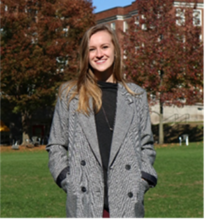
“COVID-19 is testing local governments and nonprofits as they work to meet the needs of people in their communities. Through these public service internships, students gain valuable on-the-job experience and local governments and nonprofits gain extra help when they need it most,” said Gov. Roy Cooper.
Internships are one of the most valuable learning experiences available to college students. Approximately 60% of students will hold at least one internship during their college career, according to a 2017 study by the National Association of Colleges and Employers.
With the summer of 2020 fast approaching, students’ internship opportunities ran headlong into the obstacle of COVID-19. Many of North Carolina’s college and university students found their summer jobs and internships cancelled or indefinitely postponed.
At the same moment, nonprofit organizations and local governments were confronting burgeoning pressures from the COVID-19 pandemic. Demands for services were growing while income had suddenly contracted.
“We recognized this was an extraordinary set of circumstances faced by students and organizations,” said Jenni Owen, director of the North Carolina Office of Strategic Partnerships (OSP). “Our engagement with the public, academic, and nonprofit sectors helped us discern the intense need to connect these complementary challenges.”
Thus the North Carolina COVID-19 Student Response Corps was created.
OSP works with faculty, staff, and students from North Carolina’s colleges and universities and a wide range of government and nonprofit organizations. Along with many partners, Dylan Russell at LEAD NC in particular, we leveraged knowledge and expertise to quickly pull together an effort that crossed organizational and geographic lines.
Partners at the NC Association of County Commissioners (NCACC), the NC League of Municipalities, the NC Rural Center, and Gov. Roy Cooper’s Hometown Strong Initiative polled their local contacts. OSP and LEAD NC worked with career services professionals at colleges and universities across the state. Responses were enthusiastic — many partners offered time and energy to get the effort up and running before the end of the spring semester.
A small volunteer team worked with the partners to identify organizations that wanted one or more interns. More than 150 organizations responded positively to a brief survey inquiring about their interest in hosting an intern. At the same time, OSP was conducting a survey of North Carolina’s nonprofit sector on the impacts of COVID-19. That survey included a question that yielded hundreds more expressions of interest among nonprofits that wanted an intern.
In a matter of a few weeks, institutions of higher education were advertising the NC COVID-19 Student Response Corps. Campus career services offices were jumping into action and instrumental in keeping matchmaking between students and hosts nimble. They promoted information about internship opportunities to students and helped track filled positions.
“Thanks to this great initiative, Elizabeth City State University was able to place 11 students whose internships were unexpectedly cancelled or impacted due to COVID-19 in new internships with various organizations throughout North Carolina. We look forward to cultivating these internship experiences into potential employment opportunities and careers in public service,” said Yolanda Carcana, interim director of career services at Elizabeth City State University.
Throughout the process, Response Corps partners prioritized the need to include diverse types of host organizations and institutions of higher education. The success of the effort did not come without challenges: many of the opportunities were unpaid internships, in part due to COVID-related declines in revenue. Some career services offices typically do not advertise unpaid internships given that working in an unpaid role is unfeasible for many students.
Ultimately, the virtual and flexible nature of many Response Corps internships alleviated barriers. Some host organizations relaxed in-person work requirements, making opportunities more accessible. Some colleges adjusted expectations or policies to include unpaid public service internships among the options they promoted to students. And some students were able to secure a combination of paid and unpaid work and internships, growing their work experience and professional networks.
One host organization shared their relief at finding help through the program.
“I’m a one-person department with a part-time temp. The workload doubled beginning early March as we continued our routine projects and tasks while also providing resources and support to our hospitality and tourism businesses,” explained Neha Shah, director of Pittsboro-Siler City Convention and Visitor Bureau. “We had the best intern and we made it through some rough months with a bright and helpful student.”
As of Sept. 1, nearly 120 student interns have benefited from professional opportunities that seemed impossible just a few months ago. Nearly all projects have been virtual, offering a variety of opportunities for interns, including but not limited to: grant writing, research, marketing, communications and outreach, community engagement, volunteer coordination, data analysis, and strategic planning. Host organizations are located across the state and include local economic development departments, chambers of commerce, direct service providers, arts organizations, and others.
Sierra Watson, a master of public administration student at Appalachian State University, offered perspective on her virtual work experience.
“My internship with the Town of North Wilkesboro has provided me an opportunity to have a unique remote experience in a time where adaptability is especially important. I’m helping the town research, promote, and offer grants to local business owners in hopes of keeping our community and our relationships strong during the pandemic,” she said.
Although summer has ended, opportunities for student internships have not. Many organizations continue to seek support and offer opportunities listed in this database.
LEAD NC and the NC Office of Strategic Partnerships designed and offered the Response Corps interns and others a two-day virtual training and a weekly leader speaker series. Speakers from institutions of higher education, nonprofit leaders, a foundation director, and state government leaders shared experience, expertise, and guidance. More than 300 interns, students, and others attended. Recordings of the summer training and weekly speaker series are publicly available here for all to access.
The NC COVID-19 Student Response Corps demonstrates how government-university partnerships can collaborate and innovate. Internships with government and nonprofits encourage students to consider careers in public service, help strengthen the state’s talent pipeline, and give students valuable work experience. In turn, students in the Response Corps have added capacity to nonprofit and government organizations and helped communities across North Carolina during the pandemic.
The COVID-19 Student Response Corps is meeting needs that stem from unprecedented circumstances and is more than just positive work experiences for students or opening new connections for nonprofits and local governments. It represents organizations across sectors working in partnership to solve an issue for North Carolina.
![]() Sign up for the EdDaily to start each weekday with the top education news.
Sign up for the EdDaily to start each weekday with the top education news.

